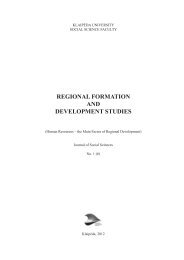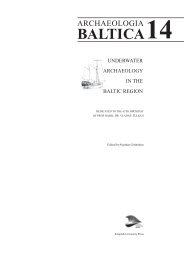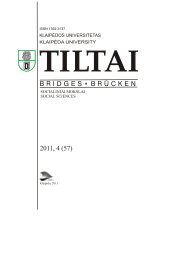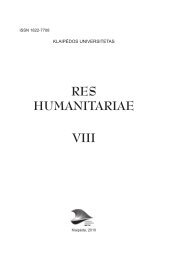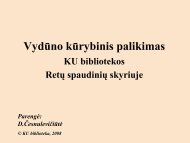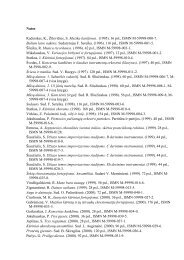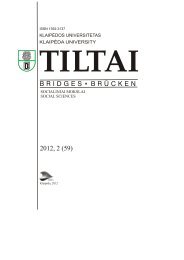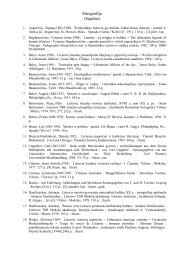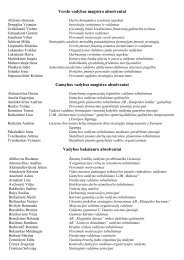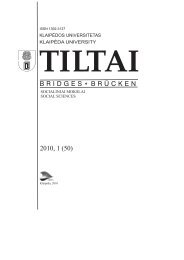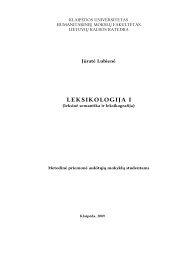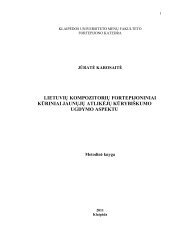BALTICA10
BALTICA10
BALTICA10
Create successful ePaper yourself
Turn your PDF publications into a flip-book with our unique Google optimized e-Paper software.
Nationalism and Politics<br />
in the Recovery<br />
of Past Astronomies<br />
STEPHEN<br />
C. MCCLUSKEY<br />
264<br />
Archaeologists Philip Kohl and Clare Fawcett extended<br />
Hobsbawm’s metaphor of the corrupting dream-world<br />
of narcotics to many of the professions that contribute<br />
to archaeoastronomical and ethnoastronomical research<br />
(1995a, p.13):<br />
Archaeologists (and perhaps linguists, folklorists, and<br />
ethnographers) must be compared with the concocters<br />
of even more powerful hallucinogens, which distort the<br />
past to the likening of nationalists intent on demonstrating<br />
the uniqueness of their people.<br />
Defenses of Nationalist Scholarship<br />
I should point out that not all studies of nationalism<br />
take such strong opposition to their subject. Trigger<br />
(1995) notes that while many crimes were committed<br />
in the name of nationalism in various parts of the<br />
world, it also provided a sense of group identity and<br />
meaning for individuals which have been the tools for<br />
resisting dynastic and colonial oppression and which<br />
led to the collapse of the Soviet Union. In this mixed<br />
evaluation, he considers that it is more important that<br />
we understand, rather than just respond emotionally to<br />
the phenomenon of nationalism.<br />
Some take a more value-neutral approach. Since the<br />
nation remains today “the largest and most powerful<br />
collectivit[y] with which people possess an affiliation,”<br />
these scholars seek to understand the “strength, scope,<br />
and intensity of this kind of collective identity, ...its<br />
origins and development... and [its] long-term persistence<br />
and/or changes” (Smith 2003, p.3; see also Anderson<br />
1991).<br />
For better or worse, there seems to be a widespread<br />
consensus in the literature that archaeology is often inextricably<br />
intertwined with external political motives.<br />
Archaeoastronomy and Nationalism<br />
Trigger (1984, p.360) pointed out one element of nationalist<br />
archaeology of special relevance to archaeoastronomy:<br />
its tendency to focus on the creative<br />
achievements of peoples assumed to be national ancestors.<br />
One version of this nationalist archaeology has a long<br />
connection with some familiar elements of archaeoastronomy:<br />
Stonehenge and the British megalithic<br />
sites. In the hands of 18th century British antiquaries,<br />
such as John Aubrey and William Stukeley, popular discussions<br />
of the Druids came to emphasize their British,<br />
rather than French origins. They became the source of<br />
ancient philosophical and scientific knowledge, which<br />
was carried Eastward from Britain to Greece, to India,<br />
and ultimately to China (Fowler 1987, p.235-236).<br />
Romantic interpretations of Stonehenge, such as William<br />
Wordsworth’s view (1958, p.472-475) that it was<br />
shaped by the Druids, so to represent their knowledge<br />
of the heavens conformed to this nationalist agenda:<br />
The popular picture of megalithic astronomy thus provides<br />
an object lesson of British cultural superiority as<br />
the source of Eastern learning, and by implication, of<br />
the legitimacy of their rule over those peoples who had<br />
benefited from their learning (Fowler 1987, p.237).<br />
Even in more recent times we find advocates of astronomy<br />
at Stonehenge making similar claims that the astronomy<br />
of Stonehenge was far in advance of anything<br />
practiced in the Mediterranean world (Hawkins 1965).<br />
While our studies must focus on the specific historical<br />
contingencies of a particular time and place, we cannot<br />
allow our investigations of past astronomical achievements<br />
to slide into a kind of simplistic essentialism,<br />
where an undefined particular “national genius” is seen<br />
as explaining those achievements.<br />
The Uses of Origin Myths<br />
Another common theme in nationalist uses of archaeology<br />
is the desire to provide a people who currently<br />
occupy a territory and its rulers, a sense of legitimacy<br />
and antiquity through links to a primordial, mythic,<br />
and sacred past and to employ archaeologically defined<br />
common elements to define the extent of a people’s<br />
proper territory. Such claims of continuity are<br />
contradicted by the evidence for the transitory nature<br />
of peoples emphasized by modern historians. Yet the<br />
creation and manipulation of these origin myths is not<br />
an exclusively modern phenomenon.<br />
In places as diverse as early medieval Europe and precolonial<br />
Mexico, ruling elites have manipulated history<br />
to create ties to their ancient predecessors (Geary<br />
2002, p.77-78; Fowler 1987, p.231-232). Turning specifically<br />
to archaeoastronomy, many of us are familiar<br />
with the Maya practice of computing astronumerological<br />
intervals to link events in the lives of contemporary<br />
rulers with significant events in the historical or distant<br />
mythic past (Aldana 2007)<br />
Such appropriations of the ancient past continued in<br />
Mexico, especially after the Mexican Revolution of<br />
1910, with which a policy of indigenismo created the<br />
image of “a coherent and defined nationality” that fully<br />
incorporated the pre-Hispanic past. Archaeology became<br />
important as a way to demonstrate the nation’s<br />
past achievements and occupied a central place in the<br />
newly restored National Museum of Anthropology<br />
(Florescano 2000).



